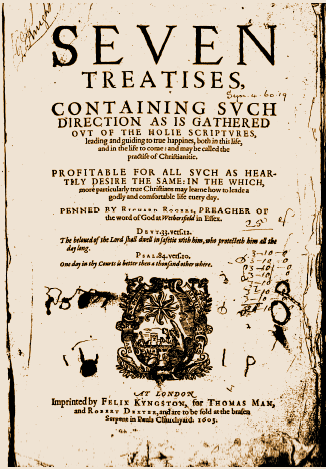To ministers ...
 "I turn to you my brethren in the ministry: And you I exhort to consider your duties laid forth at large in the Word of God, sometimes by the names and titles which he gives us, and sometime in plain commandments and charge. The names are many, as watchmen, Ezech. 33.7. Cant. 3.3. laborers, Mat. 9.37 the salt of the earth, and light of the world, Mat. 5.13-14. Shepherds, John 21.15. and the good Scribes which bring out of their treasury both old and new things, Mar. 13.52. and stewards to give every one his portion, I Cor. 4.1. and nurses, I Thessalonians. 2.7. with such like. In commandments thus: Take heed to your selves, and to the whole flock, over which the holy Ghost hath made you overseers, to feed the Church of God, which he hath purchased with his own blood, Act. 20.28. And again to Timothy: I charge thee before God, and the Lord Jesus Christ, who shall judge the quick and dead at his appearing, and in his Kingdom, preach the Word, be diligent in season and out of season, convince, reprove, exhort, with all long sufferance and doctrine, 2 Tim. 4.1-2.
"I turn to you my brethren in the ministry: And you I exhort to consider your duties laid forth at large in the Word of God, sometimes by the names and titles which he gives us, and sometime in plain commandments and charge. The names are many, as watchmen, Ezech. 33.7. Cant. 3.3. laborers, Mat. 9.37 the salt of the earth, and light of the world, Mat. 5.13-14. Shepherds, John 21.15. and the good Scribes which bring out of their treasury both old and new things, Mar. 13.52. and stewards to give every one his portion, I Cor. 4.1. and nurses, I Thessalonians. 2.7. with such like. In commandments thus: Take heed to your selves, and to the whole flock, over which the holy Ghost hath made you overseers, to feed the Church of God, which he hath purchased with his own blood, Act. 20.28. And again to Timothy: I charge thee before God, and the Lord Jesus Christ, who shall judge the quick and dead at his appearing, and in his Kingdom, preach the Word, be diligent in season and out of season, convince, reprove, exhort, with all long sufferance and doctrine, 2 Tim. 4.1-2. All which with the like, what other thing do they teach, but that all such as the Lord hath put in trust with his people, bought with so great a price, should love them tenderly, as nurses do the young children, and bear their weaknesses kindly, rather than break their hearts with sorrow? Also that they should provide for them liberally and with good allowance, and teach them the whole counsel of God, as good Scribes, and regard all sorts as the Lord's stewards, by wise applying themselves to all. Then that they should be diligent and painful, as the Lord's workmen and laborers, going before them as lights to guide, in example of uncorrupt life in all wisdom and gravity, but especially (as Christ taught his Disciples at his departing form them) in humility, John. 13.14-15. not thinking themselves too good, for Christs sake, to be their servants, 2 Cor. 4.5. And to the end, they may bring them to him, and preserve them as chaste spouses to him their only husband; to do them good privately, as their need should require, by confirming the weak, comforting the afflicted, admonishing the unruly, and being patient towards all, Ezech 34.4-5, 1 Thess 5.14. These duties (I say) the Lord enjoins us by the fore-mentioned titles which he gives to his Ministers, and by the commandments and charges annexed thereto. Now, as we would be glad he should hear us in the time of our necessity, and especially in our last and solemn day of our departure form this life: so let us hear him thus calling upon us, to have compassion on this silly, ignorant, and shiftless people.
And although the burden that he lays upon us is great, yet, are not our encouragements for that purpose exceedingly great also? The honor that he putts upon us to be his ambassadors, and to bring the message of so great a King, and the message itself not about things transitory, or earthly, but eternal, what can be like unto it: Besides, the comfort which we may reap, both by our private study in giving attendance to reading, and having that, as our ordinary labor to talk with God, (as I may say) and his good servants, when other men must toil and travel in all weather, with much care and trouble: and also the comfort by our preaching, which may easily be greater to us than to them which hear us, oh what can be in this life comparable unto it? whereby also our hearts are sweetly seasoned, and our lives far better governed, and we more safely kept from every evil way, as Solomon saith (Prov. 2.10), unless we be careless of our own good."
- Richard Rogers (1550/1-1618), from Treatise 1, Chap. 6 of the Seaven Treatises, Containing Such Direction As Is Gathered Out of the Holie Scriptures, leading and guiding to true happines, both in this life, and in the life to come: and may be called the practice of Christianitie (1603)
- Richard Rogers (1550/1-1618), from Treatise 1, Chap. 6 of the Seaven Treatises, Containing Such Direction As Is Gathered Out of the Holie Scriptures, leading and guiding to true happines, both in this life, and in the life to come: and may be called the practice of Christianitie (1603)













No comments:
Post a Comment